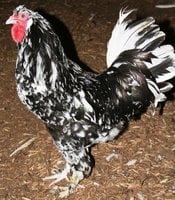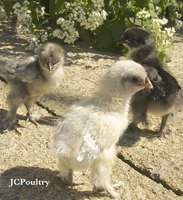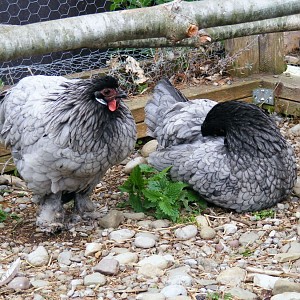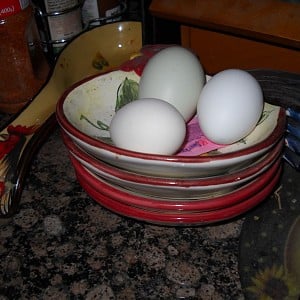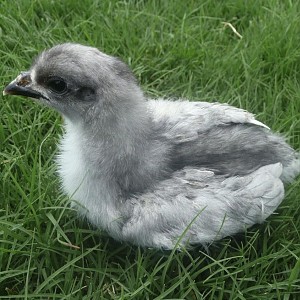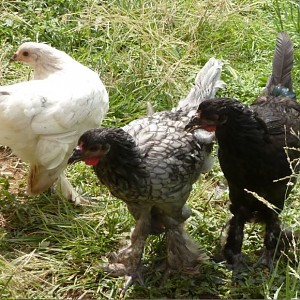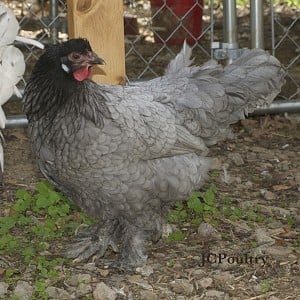Thanks for writing this - they are beautiful - I may need to add some in the future!
Navigation
Install the app
How to install the app on iOS
Follow along with the video below to see how to install our site as a web app on your home screen.
Note: This feature may not be available in some browsers.
More options
You are using an out of date browser. It may not display this or other websites correctly.
You should upgrade or use an alternative browser.
You should upgrade or use an alternative browser.
Bredas
- Added by GaryDean26
- Create date
- Updated
Bredas, Grueldres, Grueldrelands, Guelderlands, Gueldres and Kraaikops
by
Craig Russell
RR 4...
- NHMountainMan
- 5.00 star(s)
- Indyshent
- 5.00 star(s)
Pros: Excellent egg production, lovely, quiet, stately, submissive
Cons: Hard to find, seem to have poor resistance to disease
I've had a number of Breda, all originally from the same owner. They were all exceptionally lovely, stately birds. Both sexes were very submissive and consistently toward the bottom of the hierarchy. males usually had strong crows, but their constant battles with illness led me to rehome them eventually. Males were very impressive, exceptionally tall and beautiful, and had a calm, quiet air of respectability.
The sole hen I had was never once ill and laid medium cream eggs frequently. She never went broody, didn't eat much, never fought with anyone yet also never seemed to be bullied by anyone because she chose her friends wisely.
The sole hen I had was never once ill and laid medium cream eggs frequently. She never went broody, didn't eat much, never fought with anyone yet also never seemed to be bullied by anyone because she chose her friends wisely.
- BrownFamFlock
- 4.00 star(s)
Pros: Hearty, Smart, Very Good Layer
Cons: Can be bossy
We were talked into this breed when we went to pick up some Silkies from someone off Craigslist. We got two pullets and have been pleasantly surprised by these two girls. Although they can be very bossy and demanding at times, they are great pets. My kids and I can walk over and pick them up. They will fly onto one of our laps, especially if they see another chicken is occupying a lap (jealous chickens). They are top of the pecking order, smart, predator savvy and great about alerting the flock when a predator is nearby. Seldom do they miss a day of laying, so they are an excellent laying chicken. One follows me around every time I garden waiting for a worm to be dug up, then she tries to dig up the newly planted plant. Not a great characteristic I suppose, but they are full of personality.
- Sylvester017
- 4.00 star(s)
Pros: Unique appearance catches your eye, ultra calm, inquisitive, easily tamed/handled, good in a non-combative gentle flock
Cons: Startles easily, pullet toe feathers break, seems annoyed at her toe quills, gentle nature & stresses easily, don't put in an aggressive flock
Experienced our Blue Breda 4 m/o pullet who shipped to us w/ her best friend a Blue Ameraucana pullet 2 weeks ago - they were hatchmates and always pal'd around together. The vet's fecal lab tests showed they came w/ round worms so we treated them both for that. Secondly the Breda must have stressed from the shipping, plopped in a new environment, w/ new people so she exhibited CRD symptoms so we had to treat her for that. Now they are both back to good health again. Thirdly we are now experiencing the Breda picking at her toe feathers to the point that her companion started to pick at the blood - so we immediately began dipping the Breda's legs in Grannick's Bitter Apple a couple times a day to keep both birds from pecking the toes. I was prepared for these issues in getting a Breda but just didn't think all of it would happen the moment she arrived. We experienced having a Silkie with delicate health so maintenance on gentle breeds is routine for us.
Health issues aside we are thrilled with the Breda personality - calm, curious, unafraid of coming up to receive a treat from the hand, easily picked up, one of the easiest breeds I've ever had that tamed so quickly. Hope she continues this attribute at full maturity. JC Poultry said Breda tend to be easily bullied and bottom of pecking order so we have nothing but gentle breeds in the flock - APA Ameraucanas, Silkies, and her. I'm not fond of the health issues like susceptibility to CRD, Bumblefoot, broken toe feathers - but we are aware watching for these things thanks to previous input from other owners/ breeders. I have a Silkie w/ similar issues and we know when a hen is "off" to schedule a vet visit. Taking a chicken is no more tedious than taking a cat or dog to the vet except that the chickens get a lot more attention in the vet office! A tall rare Breda w/ no comb and cavernous nostrils is worth a capture on the vet's camera phone!
There are hardier, more prolific, meatier breeds in the chicken world but I have yet to come across other breeds so uniquely rare and regal in appearance as the Breda along w/ a gentle nature. The non-combative Breda personality is so perfect for our gentles flock who are non-combative breeds. Breda is so worth keeping around just for her personality alone - the beauty and eggs yet to come will just be an added bonus!
Health issues aside we are thrilled with the Breda personality - calm, curious, unafraid of coming up to receive a treat from the hand, easily picked up, one of the easiest breeds I've ever had that tamed so quickly. Hope she continues this attribute at full maturity. JC Poultry said Breda tend to be easily bullied and bottom of pecking order so we have nothing but gentle breeds in the flock - APA Ameraucanas, Silkies, and her. I'm not fond of the health issues like susceptibility to CRD, Bumblefoot, broken toe feathers - but we are aware watching for these things thanks to previous input from other owners/ breeders. I have a Silkie w/ similar issues and we know when a hen is "off" to schedule a vet visit. Taking a chicken is no more tedious than taking a cat or dog to the vet except that the chickens get a lot more attention in the vet office! A tall rare Breda w/ no comb and cavernous nostrils is worth a capture on the vet's camera phone!
There are hardier, more prolific, meatier breeds in the chicken world but I have yet to come across other breeds so uniquely rare and regal in appearance as the Breda along w/ a gentle nature. The non-combative Breda personality is so perfect for our gentles flock who are non-combative breeds. Breda is so worth keeping around just for her personality alone - the beauty and eggs yet to come will just be an added bonus!
- RFR of CA
- 4.00 star(s)
Pros: Actually prefer confinement and never wander far. Nonagressive roosters. Good layers.
Cons: A bit flighty and can really FLY! Feet not good in wet or muddy climates. Slow growers.
I have owned Blue Bredas for about 3 years now. They are an ornamental breed that happens to also produce a good quantity of eggs, which are creamy white. Only medium first year, but get to large by year two. Long lived per the literature, and mine have been hardy overall. They have long hard feathers on feet that do not do well on wire or in mud. Hens start laying about 8-9 months and roosters take about the same time to crow. Can be hard to sex for awhile. Blues tend to have horned combs and crests are a bit weak. Using the blacks from the Mottled group to fix some of the Blue issues.
I started the Mottled and Cuckoo varieties last year. Cuckoo are probably the most timid. (Beware that when Bredas startle, they fly directly upward quail style! Watch your nose

Cuckoos are the tallest by far of the three, and the roosters are the heaviest. Eggs are a bit off white. Strong crest, vulture hocks, and great upright postures.
I find that mottled are the calmest of the three. Eggs are almost tan, and pointy. so this will need work. I am blending the blacks in from my Blue group to help fix the egg color. Nice heavy and wide roosters, great crests, vulture hocks, proper combs and nostrils, and postures.




I started the Mottled and Cuckoo varieties last year. Cuckoo are probably the most timid. (Beware that when Bredas startle, they fly directly upward quail style! Watch your nose

Cuckoos are the tallest by far of the three, and the roosters are the heaviest. Eggs are a bit off white. Strong crest, vulture hocks, and great upright postures.
I find that mottled are the calmest of the three. Eggs are almost tan, and pointy. so this will need work. I am blending the blacks in from my Blue group to help fix the egg color. Nice heavy and wide roosters, great crests, vulture hocks, proper combs and nostrils, and postures.
- Purchase Date
- 2012-03-01
- RhodeRunner
- 4.00 star(s)
Pros: Friendly, docile, beautiful, funny, clean, feed conservative, easy to confine or free-range, and a respectable layer of white eggs.
Cons: Lower on the pecking order, picky, may need pampered (more information below)
The Breda hen is calm, docile, and somewhat timid at the same time. They are rather social, and walk right up to us hoping for treats and pets. But, they can be shy with strangers, and will spook easier then most dual-purpose breeds. In a mixed flock, the hens are low on the pecking order and may get bullied. If bullied, hens tend to be more reserved, and can become skittish.
Hens are good layers of white eggs, and start laying around seven months. We will have to wait and see if they go broody.
The Breda rooster is busy being a chicken, and is not as interactive as the hens. Our boys have not been aggressive with each other, or towards humans. They avoid fighting. We had a few that where rough on the pullets (cockerels) and do not let those roosters stay with the hens.
The rooster averages around 6 pounds (hens around 5), and will make a fine dinner. They do take awhile to put on their weight, so be prepared to wait at least seven months for a decent meal. Even then, they will be smaller.
The breed is very capable of movement. They have long legs and lightweight bodies. They can fly/leap rather high, especially if spooked. However, the normal nature of the bred is to be lazy, so they usually are very easy to confine.
The Breda is a not a big eater, and is actually often picky about what it consumes. They enjoy their chicken feed, but sometimes do not tough their table scraps. They like foraging, but are also happy in confinement. They are not the most cautious foragers, so it would be safest to keep them confined if you have predator troubles.
They are finicky about cleanliness. They do not like to walk in muddy, or wet conditions. In the winter they stay inside their coop, so they can avoid walking in as little as 1/4 inch of show. But, the breed hasn't had any troubles with the cold.
Health-wise, the breed is very easy to keep. We haven't noticed any health ailments. However, occasionally a foot feather fall out (particularly while they are growing) and they will dot blood all over their pen/coop.
Hens are good layers of white eggs, and start laying around seven months. We will have to wait and see if they go broody.
The Breda rooster is busy being a chicken, and is not as interactive as the hens. Our boys have not been aggressive with each other, or towards humans. They avoid fighting. We had a few that where rough on the pullets (cockerels) and do not let those roosters stay with the hens.
The rooster averages around 6 pounds (hens around 5), and will make a fine dinner. They do take awhile to put on their weight, so be prepared to wait at least seven months for a decent meal. Even then, they will be smaller.
The breed is very capable of movement. They have long legs and lightweight bodies. They can fly/leap rather high, especially if spooked. However, the normal nature of the bred is to be lazy, so they usually are very easy to confine.
The Breda is a not a big eater, and is actually often picky about what it consumes. They enjoy their chicken feed, but sometimes do not tough their table scraps. They like foraging, but are also happy in confinement. They are not the most cautious foragers, so it would be safest to keep them confined if you have predator troubles.
They are finicky about cleanliness. They do not like to walk in muddy, or wet conditions. In the winter they stay inside their coop, so they can avoid walking in as little as 1/4 inch of show. But, the breed hasn't had any troubles with the cold.
Health-wise, the breed is very easy to keep. We haven't noticed any health ailments. However, occasionally a foot feather fall out (particularly while they are growing) and they will dot blood all over their pen/coop.

